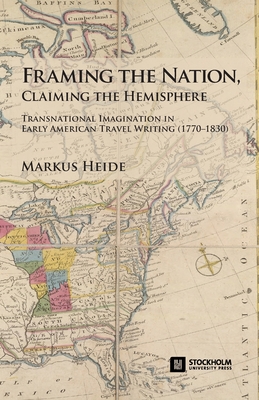Framing the Nation, Claiming the Hemisphere: Transnational Imagination in Early American Travel Writing (1770-1830)

Framing the Nation, Claiming the Hemisphere: Transnational Imagination in Early American Travel Writing (1770-1830)
Travel reports have shaped the emergence of early U.S. culture and its "geographical imagination" (David Harvey). Framing the Nation, Claiming the Hemisphere examines the trans-national imagination in travel reports by American authors written between 1770 and 1830. Its range is from John and William Bartram's pre-revolutionary travelogues and Jonathan Carver's exploratory report on his journey in the Great Lakes region (1778), to Olaudah Equiano's The Interesting Narrative (1789), to early nineteenth-century reports, such as Anne Newport Royall's Sketches of History, Life, and Manners, in the United States (1826) and William Duane's A Visit to Colombia (1826). The chapters of the monograph concentrate on writing about journeys to the North American 'interior', the Caribbean, Latin America, and Africa. The primary sources were written between the beginning of the struggle against British rule, following the end of the French and Indian War, and the beginning of Andrew Jackson's presidency. The decades between 1770 and 1830 were times of shifting colonial boundaries, nation-building, and emergent discourses of collective identification in North America. The study reads travel writing in the context of the identity-generating discourses of nation-building, imperialism, anti-colonialism, and cosmopolitanism.In contrast to scholarship that engages a notion of Americanness based primarily on 'domestic' outlooks and experiences such as westward expansion (the frontier), the study highlights the function of categories such as the outside world, neighboring nations, and colonial empires in the emergence of U.S. national literary imagination. How does a shift in focus from a discursive 'domestication' of North American space to an interest in the Othering of what lies beyond national borders affect the understanding of the emergent national self? These are the kind of questions that begin by seeing the transnational as a fundamental element of national emergence.The monograph ultimately works to demonstrate how travel writing - with very few exceptions - supports and affirms processes of nation-building. Thus, the national narrative evolves from representations of contact scenarios in North America, in the transatlantic world, and around the globe. Without ignoring the roles of national mythology, the analysis concentrates on the continual co-existence of fluid notions of both 'home' and 'abroad' in times of shifting geographical borders. From such a perspectiv
PRP: 165.25 Lei
Acesta este Prețul Recomandat de Producător. Prețul de vânzare al produsului este afișat mai jos.
148.72Lei
148.72Lei
165.25 LeiIndisponibil
Descrierea produsului
Travel reports have shaped the emergence of early U.S. culture and its "geographical imagination" (David Harvey). Framing the Nation, Claiming the Hemisphere examines the trans-national imagination in travel reports by American authors written between 1770 and 1830. Its range is from John and William Bartram's pre-revolutionary travelogues and Jonathan Carver's exploratory report on his journey in the Great Lakes region (1778), to Olaudah Equiano's The Interesting Narrative (1789), to early nineteenth-century reports, such as Anne Newport Royall's Sketches of History, Life, and Manners, in the United States (1826) and William Duane's A Visit to Colombia (1826). The chapters of the monograph concentrate on writing about journeys to the North American 'interior', the Caribbean, Latin America, and Africa. The primary sources were written between the beginning of the struggle against British rule, following the end of the French and Indian War, and the beginning of Andrew Jackson's presidency. The decades between 1770 and 1830 were times of shifting colonial boundaries, nation-building, and emergent discourses of collective identification in North America. The study reads travel writing in the context of the identity-generating discourses of nation-building, imperialism, anti-colonialism, and cosmopolitanism.In contrast to scholarship that engages a notion of Americanness based primarily on 'domestic' outlooks and experiences such as westward expansion (the frontier), the study highlights the function of categories such as the outside world, neighboring nations, and colonial empires in the emergence of U.S. national literary imagination. How does a shift in focus from a discursive 'domestication' of North American space to an interest in the Othering of what lies beyond national borders affect the understanding of the emergent national self? These are the kind of questions that begin by seeing the transnational as a fundamental element of national emergence.The monograph ultimately works to demonstrate how travel writing - with very few exceptions - supports and affirms processes of nation-building. Thus, the national narrative evolves from representations of contact scenarios in North America, in the transatlantic world, and around the globe. Without ignoring the roles of national mythology, the analysis concentrates on the continual co-existence of fluid notions of both 'home' and 'abroad' in times of shifting geographical borders. From such a perspectiv
Detaliile produsului













